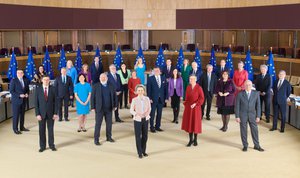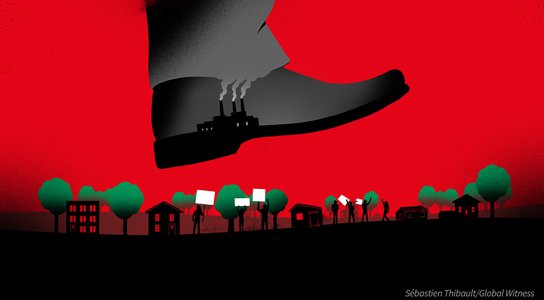Launching the European Green Deal in December 2019, European Commission (EC) president Ursula von der Leyen called it the continent’s “man on the moon moment”. The plan aims to achieve net-zero emissions in the European Union (EU) by 2050, and while it has been criticised for not being ambitious enough it does suggest that Europe is waking up to the need to face climate change head-on.
Von der Leyen is backed up by the EC’s 27 commissioners – professional politicians responsible for leading the development of European policy in specific areas, one from each EU member state. The Green Deal cuts a swathe across these policy briefs, touching everything from transport to food production. But do the commissioners tasked with implementing it have their priorities straight?

The members of European Commission. Photo credit: European Commission Audiovisual Service
Years of research have shown how fossil fuel companies and their allies lobby European institutions to get their way on key legislation. Now, new analysis by Global Witness reveals that politicians at the very top of the von der Leyen commission itself – including the Commission’s vice president and commissioners with vital Green Deal briefs – have until very recently had close ties to the fossil fuel industry.
The links – which range from family relationships with fossil fuel industry insiders to payments for working for billionaires via offshore companies – are based on ethics disclosures that commissioners are required to submit when taking up their posts. Together, they raise serious questions about the ability of the current Commission to address the most pressing political issue of our time.
Stella Kyriakides
As the commissioner in charge of health and food safety, Stella
Kyriakides is heavily involved with work on the European Green Deal, and
she wants you to know it – her official Twitter account has used the
#EUGreenDeal hashtag more than 40 times. As part of the EU’s Farm to Fork strategy, Kyriakides’s department aims to implement a “fair, healthy and environmentally-friendly food system” – important work when food production is responsible for around a quarter of global greenhouse gas emissions.
The #EUFarm2Fork Strategy is a unique opportunity to make
— Stella Kyriakides (@SKyriakidesEU) May 20, 2020
🇪🇺 food systems a 🌍 model of sustainability & meet citizens aspirations for healthy food. This is why sustainability is a key growth strategy.#EUGreenDeal pic.twitter.com/rQ95avxWb2
Motor Oil Hellas operates the Corinth Refinery, the largest privately held industrial complex in Greece, processing 186,000 barrels of crude oil per day. In the 2019 financial year, a less than usually productive period, the company produced more than 7.3 million tonnes
of petrol, diesel and jet fuel, as well as a further 4.7 million tonnes
of other fuels and byproducts. If the major refined products alone were
burned in car and aeroplane engines, they would produce more than 23
million tonnes of carbon dioxide – a third of Greece’s total yearly
emissions.
The company’s website also boasts
that it has “been leading the developments [sic] towards the
liberalization of the Greek natural gas market since 2010”. As well as
directly supplying fossil gas to customers, Motor Oil has been involved
in exploration for new sources of the fuel as far away as Texas and Tanzania.
Close connections between European institutions and big gas companies are locking the continent into an unsustainable energy future
Responding to questions posed by Global Witness, a spokesperson for Kyriakides said that the Commission had “put in place a system of particularly robust protections” regarding conflicts of interest and that her husband’s directorships did not constitute a conflict as defined by the EC Code of Conduct.
Adina Vălean
A central plank of the Commission’s financial support for the fossil fuel industry is the Connecting Europe Facility (CEF), which channels taxpayer money into strategic investments in energy, telecoms and transport projects. As of May 2020 the CEF had spent €1.3 billion subsidising fossil gas projects, mostly for transmission infrastructure like pipelines.
In establishing the CEF, as with any legislation, the EC worked with the European Parliament via dedicated rapporteurs – MEPs who take responsibility for negotiating with the Commission and the European Council to shape the policy. Starting in 2011, one of these rapporteurs was Adina Vălean, a Romanian politician who is now in charge of the transport portfolio in von der Leyen’s cabinet.
Shipping's methane emissions grew 150% because of increased LNG use. The EU's reaction? Let's spend another €68m on it to boost the "green" recovery. @AdinaValean, LNG is not the solution, it's the problem. MEPs should regulate methane in #MRV revision https://t.co/ugi5XJhzKx
— Transport & Environment (@transenv) August 14, 2020
Vălean was closely involved in the establishment of the facility and continues to be involved in the disbursement of CEF funds: in July, her department announced more than €60 million of CEF investment in projects to support the use of fossil gas to power cargo ships, drawing fire for the plan’s likely contribution to methane emissions. All this makes her links to the fossil fuel industry particularly troubling.
According to Vălean’s declaration of interests,
in 2009 and 2010 she served on the advisory board of Finite Assets Ltd,
a company apparently registered in the British Virgin Islands. A similar declaration
filed by her husband, a Romanian politician, and published online by a
local investigative journalist, gives her annual fee for consultancy
work with Finite Assets – work she carried out while serving as an MEP –
as €104,325. At the time of Vălean’s advisory board membership, Finite
Assets appears to have been wholly owned by Rompetrol Holding S.A., a Swiss company which according to media reports was in turn owned by the billionaire Dinu Patriciu.
Patriciu,
who died in 2014, entered the energy industry in 1998, leading a group
of investors to buy Rompetrol, an oil and gas company that was owned by
the Romanian state until 1993. Over the next decade he expanded the
company into a major player in the eastern European energy sector,
before selling it to KazMunayGas, Kazakhstan’s state oil and gas
company, in two separate deals between 2007 and 2009, making him
Romania’s richest man. Patriciu later started an experimental but
apparently unsuccessful venture to extract fossil gas from shale in the
Black Sea.
There is no suggestion that Vălean’s connections to Patriciu influenced her work in the European Parliament or on the Connecting Europe Facility. But her closeness to the industry raises broader questions about her priorities and suitability for a Commission post of key significance for carbon emissions.
In December 2018, Vălean chaired
the European Parliament’s delegation to the 24th United Nations Climate
Change Conference (COP24) in Poland, participating in crucial climate
diplomacy at the highest level. Six months earlier, she was a headline
speaker at the lobby group Gas Industry Europe’s annual conference, alongside the CEO of Romania’s state gas company, Transgaz, which has received more than €180 million in CEF funding to date. Addressing the conference, Vălean praised the attendees
for “keeping our homes warm and mak[ing] our factories run”, describing
fossil gas as “essential for the transition to a lower-emissions
economy”.
This wasn’t Vălean’s first industry event. In 2017 she hosted a ‘dinner debate’ advertised by the umbrella group GasNaturally, which found that “gas is a flexible and an affordable fuel which can reduce carbon emissions and improve air quality in all energy sectors.” In 2015, she was scheduled to speak alongside GasNaturally’s chairman and executives from Eni and Statoil at a workshop sponsored by the International Association of Oil and Gas Producers, while as recently as November 2019—days before her confirmation as a commissioner—she hosted a GasNaturally event on methane emissions
Is
a politician willing, historically, to take substantial sums from a
fossil fuel tycoon and to speak at high-profile industry events now
likely to be well-placed to implement a radical shift of Europe’s
economy away from carbon-based energy?
Vălean’s office did not respond directly to a request for comment from Global Witness.
Josep Borrell Fontelles
Tackling the climate crisis facing both Europe and the world requires
radical action: settling for stopgaps and half-measures is a recipe for
human and ecological disaster. Nothing sums up this half-way house
approach like combined-cycle gas turbine (CCGT) power generation.
"The :flag-eu: EU, as it did in Kyoto, is going to take the lead in the fight against #ClimateChange. We know it's a problem we can't solve alone" @JosepBorrellF joins the #COP25 in Madrid & reinforces the EU's commitment to the #ParisAgreements :earth_africa: #United4Climate pic.twitter.com/5XWGbMQLgE
— European External Action Service - EEAS :flag-eu: (@eu_eeas) December 2, 2019
From 2009 to 2016, EC vice president Josep Borrell Fontelles served on the board of Abengoa, a Spanish energy company. As well as working on solar, wind and biomass generation, Abengoa has been involved in the construction of more than a dozen CCGT plants in countries ranging from Mexico to Morocco.
Borrell’s work for Abengoa – for which he received up to €300,000 a year – isn’t his first time in the energy industry: he holds a masters degree in oil economics and spent almost a decade as an engineer for Spain’s national petroleum company, Cepsa. But it has already proved controversial. In 2012 he was forced to resign as president of the European University Institute after failing to declare his interest in Abengoa. In 2018 he was sanctioned for insider trading by Spain’s securities regulator for ordering a person close to him to sell company shares while having access to privileged information as a member of the board.
Borrell’s history with Abengoa raises questions for a politician so closely involved in European environmental policy. As the EU’s high representative for foreign affairs and security policy, Borrell represented the bloc at COP25 in 2019. In a blog post from the time, he describes “embark[ing] on [a] new phase of ‘Green Deal diplomacy’”, work which will help shape any commitments agreed at COP26 in Glasgow later this year—a summit which has been billed as the world’s last chance to avert the most destructive effects of man-made climate change.
Abengoa’s links to European institutions go beyond Borrell, though. In 2015 the European Investment Bank (EIB) loaned the company €125 million to fund research and development. Abengoa suffered a financial collapse later the same year – an outcome so easily foreseeable that it was predicted by a 17-year-old – and was subsequently investigated for alleged accounting fraud, an inquiry which as of August 2020 had yet to conclude.
These episodes haven’t stopped former Abengoa staff from landing plum jobs in Luxembourg and Brussels
Abengoa also has a history of alleged underhand behaviour in relation
to biofuels – another group of energy sources hailed by their
proponents as ‘bridge fuels’, but which are controversial among climate
experts. In 2008, the company was accused of misquoting
Transport & Environment, a climate NGO, in full-page newspaper
adverts designed to lobby MEPs ahead of crucial votes on biofuels.
Meanwhile, a long-running investigation
by the EC itself into alleged rigging of ethanol prices by Abengoa and
other companies has yet to conclude. There is no evidence to connect
these various scandals at Abengoa with Borrell’s role as a director.
These
episodes haven’t stopped former Abengoa staff from landing plum jobs in
Luxembourg and Brussels. Two Abengoa employees, one responsible for
negotiating loan agreements, joined the EIB in senior roles in 2017 and
2018. Another, who worked specifically on cultivating relationships
between Abengoa and European institutions, now works on energy research
at the body that manages the Connecting Europe Facility.
Responding
to a request for comment from Global Witness, a spokesperson for
Borrell said that the Commission’s protections against conflicts of
interest were “particularly robust” and that “prior to entry into office
... Mr. Borrell has satisfactorily gone through the established
procedures in place in the European Commission for the screening of
potential or perceived conflict of interests.” They added that Borrell
had “submitted himself, like any future member of the College [of
Commissioners] to thorough scrutiny and underwent subsequently a hearing
by the European Parliament.”
A spokesperson for Abengoa did not respond to a request for comment.
Would you trust these politicians with your planet?
The tangled web linking Borrell, Abengoa and the EU is symptomatic of the outsize influence of big companies on the continent’s political life. Like his colleagues Kyriakides and Vălean, Borrell entered the European institutions after stints in national politics. All three commissioners carry the baggage of years spent in the messy business of top-flight political deal-making, where armies of lobbyists ensure that commercial interests are fully represented.
Politicians like to think of their work as the ‘art of the deal’ – but if climate catastrophe is going to be mitigated, let alone avoided, Europe needs to resist corporate lobbying and take tough decisions which won’t make all sides happy. Across the world there is an increasing popular demand for radical action on climate change; a truly effective European Green Deal needs to grasp this and run with it.Europe doesn’t need new power plants burning fossil gas, however efficient they claim to be
Europe doesn’t need new power plants burning fossil gas, however efficient they claim to be – it needs investment in battery technology to enable fully renewable energy sources like solar and wind power to respond rapidly to fluctuations in demand. If Europe doesn’t need new gas plants, it doesn’t need new pipeline infrastructure to feed them either – and it certainly doesn’t need more exploration for new sources of fossil gas, or oil refineries producing millions of tonnes a year of toxic fuel for cars and aeroplanes.
History may yet view the European Green Deal – along with the coronavirus crisis and China’s commitment to decarbonise by 2060 – as a turning point in the battle to keep emissions down and to prevent the most catastrophic potential outcomes of man-made global warming. But what our political leaders do right now will determine whether historians look back from a marginally worse version of the world we see today – more floods, more droughts, more forest fires – or one where life is almost unimaginably different for hundreds of millions of people.
Responding in general terms to the allegations posed by Global Witness, a spokesperson for the Commission said that neither Kyriakides, Vălean nor Borrell was “directly in charge of energy and climate policy”: “This means that they do not take decisions on their own in areas which are related to energy or climate policy. They participate in decisions of the Commission as one of 27 Members of the College [of Commissioners] where decisions are made on the basis of proposals of the Commissioners in charge of the policy area, in coordination with the relevant Executive Vice-Presidents and the President of the Commission. Such proposals are preceded by a preparation at administrative level with several services involved.”
- Download PDF version : New Deal, Old Guard (855.1 KB), pdf


